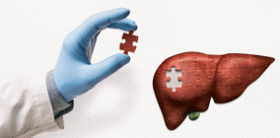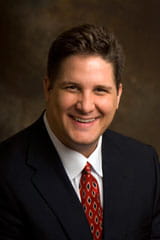
Living-Donor Liver Transplant for Patients with Liver Cancer
Activity description
Living-donor liver transplants are life-saving treatments that can greatly decrease transplant waitlist times for recipients and allow donors to meaningfully contribute to others’ lives. Christopher Hughes, MD, the surgical director of the UPMC Liver Transplant Program, will discuss the utilization of living-donor liver transplant for patients diagnosed with advanced liver cancer, including unresectable metastatic colorectal cancer, hepatocellular carcinoma, intrahepatic cholangiocarcinoma or mixed cholangio/hepatocellular carcinoma, hilar cholangiocarcinoma, and unresectable neuroendocrine tumor.
This activity will provide an overview of the living-donor liver transplant procedure, the advantages and disadvantages of living-donor liver transplant, and the optimal timing for offering living donations to patients with liver cancer. Dr. Hughes will discuss the innovative approach advanced by experts at UPMC in which patients with liver cancer are offered the option of a living-donor transplant. He will discuss the experience and expertise offered by the UPMC Liver Transplant Program and their collaborative approach to working with referring physicians.
Provided by
This activity is provided by Optum Health Education and UPMC.
Commercial support
No commercial support was received for this activity.
Required hardware/software
Please ensure you are using the web-browser Chrome and disable any pop-up blocking software. Click here for information on how to enable pop-ups.
Target Audience
This activity is designed to meet the educational needs of case managers, counselors, nurses, nurse practitioners, pharmacists, pharmacy technicians, physicians, PAs, psychologists, social workers, therapists and other health care professionals who have an interest in liver cancer and liver transplantation.
Learning Objectives
At the end of this educational activity, participants should be able to:
- Review the current state of liver transplantation and living-donor liver transplantation in the United States and the advantages and disadvantages of living-donor transplant.
- Recognize the indications for a living-donor liver transplant for patients with advanced liver cancer and the optimal timing for a patient to receive a living-donor liver transplant.
- Examine UPMC’s protocols for living-donor liver transplant for unresectable metastatic colorectal cancer, hepatocellular carcinoma, intrahepatic cholangiocarcinoma or mixed cholangio/hepatocellular carcinoma, hilar cholangiocarcinoma, and unresectable neuroendocrine tumor.
- Realize the benefits of living-donor liver transplant for patients with liver cancer who have exhausted all other treatment options.
Presenter
C hristopher Hughes, MD
hristopher Hughes, MD
Surgical Director of Liver Transplantation
Thomas E. Starzl Transplantation Institute
Associate Professor of Surgery
University of Pittsburgh School of Medicine
Pittsburgh, PA
About the presenter
Dr. Hughes earned his medical degree and completed his residency at the University of Tennessee in Memphis. Shortly afterwards, he completed a fellowship in transplant surgery at the Mayo Clinic in Rochester, Minn. Prior to joining the staff at UPMC, Dr. Hughes was an associate professor of surgery at Emory University School of Medicine and chair, division of transplant surgery at the Mayo Clinic, Florida. Dr. Hughes’ areas of research are transplantation in the HIV-positive population, infectious diseases in transplantation, organ donation and allocation, and donation after cardiac death. Dr. Hughes is a committee member within the United Network of Organ Sharing (UNOS), is a member of the American College of Surgeons and the American Society of Transplant Surgeons and is a faculty member of the Health Resources and Services Administration’s National Learning Congress.
Activity planners
Elizabeth Albert, MD
Activity Manager
OptumHealth Education
Rebecca Gleason, RN, CCM
Activity Manager
OptumHealth Education
Disclosures of relevant financial relationships
In accordance with the Accreditation Council for Continuing Medical Education's (ACCME) Standards for Integrity and Independence in Accredited Continuing Education, OptumHealth Education (OHE) requires all those in control of educational content to disclose their financial relationships with ineligible companies within the prior 24 months. Ineligible companies are defined by the ACCME as companies whose primary business is producing, marketing, selling, re-selling, or distributing health care products used by or on patients. Individuals must disclose all financial relationships, regardless of the amount, with ineligible companies and regardless of their view of the relevance of the relationship to the education. OHE ensures that the content is independent of commercial bias.
The activity faculty or planners have no financial relationships to disclose.
Method for calculating CE credit
CE credit was calculated by the complexity of content.
Accreditation statement In support of improving patient care, this activity has been planned and implemented by Optum Health Education and UPMC. Optum Health Education is jointly accredited by the Accreditation Council for Continuing Medical Education (ACCME), the Accreditation Council for Pharmacy Education (ACPE) and the American Nurses Credentialing Center (ANCC), to provide continuing education for the health care team.
In support of improving patient care, this activity has been planned and implemented by Optum Health Education and UPMC. Optum Health Education is jointly accredited by the Accreditation Council for Continuing Medical Education (ACCME), the Accreditation Council for Pharmacy Education (ACPE) and the American Nurses Credentialing Center (ANCC), to provide continuing education for the health care team.
Credit designation statements This activity was planned by and for the health care team, and learners will receive 1.00 Interprofessional Continuing Education (IPCE) credits for learning and change.
This activity was planned by and for the health care team, and learners will receive 1.00 Interprofessional Continuing Education (IPCE) credits for learning and change.
Nurses
The participant will be awarded up to 1.00 contact hour(s) of credit for attendance and completion of supplemental materials.
Nurse practitioners
The American Academy of Nurse Practitioners Certification Program (AANPCP) accepts credit from organizations accredited by the ACCME and ANCC.
Pharmacists/Pharmacy technicians
This activity is approved for 1.00 contact hour ([0.10] CEU) in states that recognize ACPE.
Attending the full program will earn 1.00 contact hour.
Unique Activity Number(s): JA0007123-9999-21-313-H01-P/T
Physicians
Optum Health Education designates this enduring activity for a maximum of 1.00 AMA PRA Category 1 Credit(s)™. Physicians should claim only the credit commensurate with the extent of their participation in the activity.
PAs
The American Academy of Physician Assistants (AAPA) accepts credit from organizations accredited by the ACCME.
Case managers
The Commission for Case Manager Certification has approved this program for a maximum of 1.00 clock hours for Certified Case Managers (CCM).
Psychologists
Optum Health Education is approved by the American Psychological Association (APA) to offer continuing education for psychologists. Optum Health Education maintains responsibility for this program. 1.00 CE hour.
Social workers![]() As a Jointly Accredited Organization, Optum Health Education is approved to offer social work continuing education by the Association of Social Work Boards (ASWB) Approved Continuing Education (ACE) program. Organizations, not individual courses, are approved under this program. State and provincial regulatory boards have the final authority to determine whether an individual course may be accepted for continuing education credit. Optum Health Education maintains responsibility for this course. Social workers completing this course receive 1.00 enduring continuing education credits.
As a Jointly Accredited Organization, Optum Health Education is approved to offer social work continuing education by the Association of Social Work Boards (ASWB) Approved Continuing Education (ACE) program. Organizations, not individual courses, are approved under this program. State and provincial regulatory boards have the final authority to determine whether an individual course may be accepted for continuing education credit. Optum Health Education maintains responsibility for this course. Social workers completing this course receive 1.00 enduring continuing education credits.
Counselors and/or marriage and family therapists
CA: The Board of Behavioral Sciences has deferred CE course approvals to APA and ASWB for its licensees. See those approvals under Psychologists and Social Workers.
Other States: If your state is not specifically listed, nearly all state Counselor and MFT boards accept either APA or ASWB approval, or are reciprocal with other state licensing board approvals, such as those listed below. Check with your board to be sure.
Attendance
A certificate of attendance will be provided to learners upon completion of activity requirements, enabling participants to register with licensing boards or associations that have not been preapproved for credits. To apply for credit types not listed above, participants should use the procedure established by the specific organization from which they wish to obtain credit.
Available Credit
- 1.00 ACPE - Pharmacists
- 1.00 ACPE - Pharmacy Technicians
- 1.00 AMA - Physicians
- 1.00 ANCC - Nurses
- 1.00 APA - Psychologists
- 1.00 Attendance - General Attendance
- 1.00 CCMC - General - Case Managers
You must be logged into your account to participate in this activity. Get started by clicking “Continue” and completing the “Pre-Activity Assessment”; then follow the prompts at the bottom of the screen. At the end of the activity, you will be able to view, save or print your certificate of participation. A complete listing of your activities can be found under “My Account,” “My Activities.”

 Facebook
Facebook Twitter
Twitter LinkedIn
LinkedIn Forward
Forward